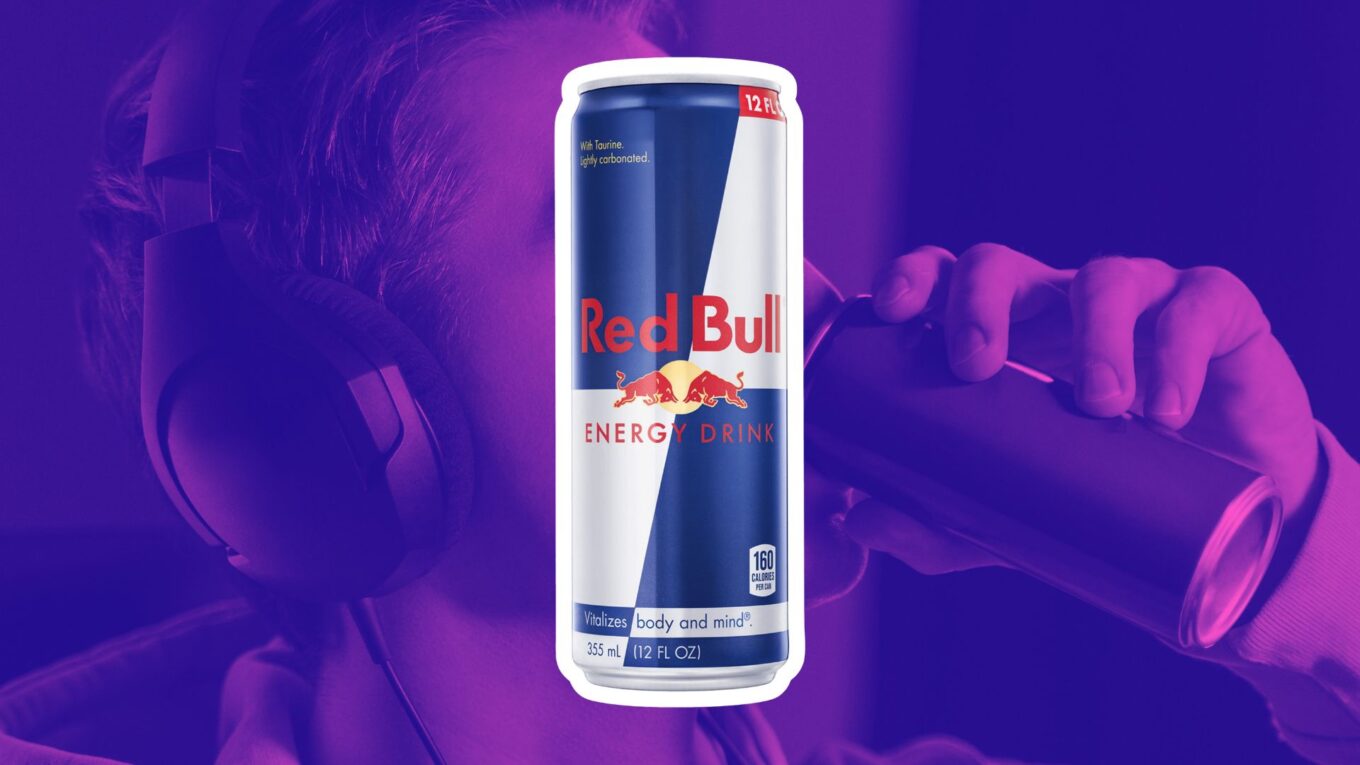Many people turn to Red Bull for a quick energy boost, but often wonder: how long does a Red Bull last?
The effects can vary widely from person to person, leaving some unsure about when the buzz will wear off.
This uncertainty can lead to overconsumption or poorly timed intake, potentially disrupting sleep or daily routines.
Fortunately, understanding the key factors that influence Red Bull’s duration can help you make smarter choices about when and how much to drink.
To better predict and manage the effects of energy drinks, consider elements like caffeine content, individual tolerance, and consumption habits.
This article will explore the main factors determining how long Red Bull’s impact lasts, helping you make more informed decisions about your energy drink consumption.
Key Ingredients Influencing Red Bull’s Effects
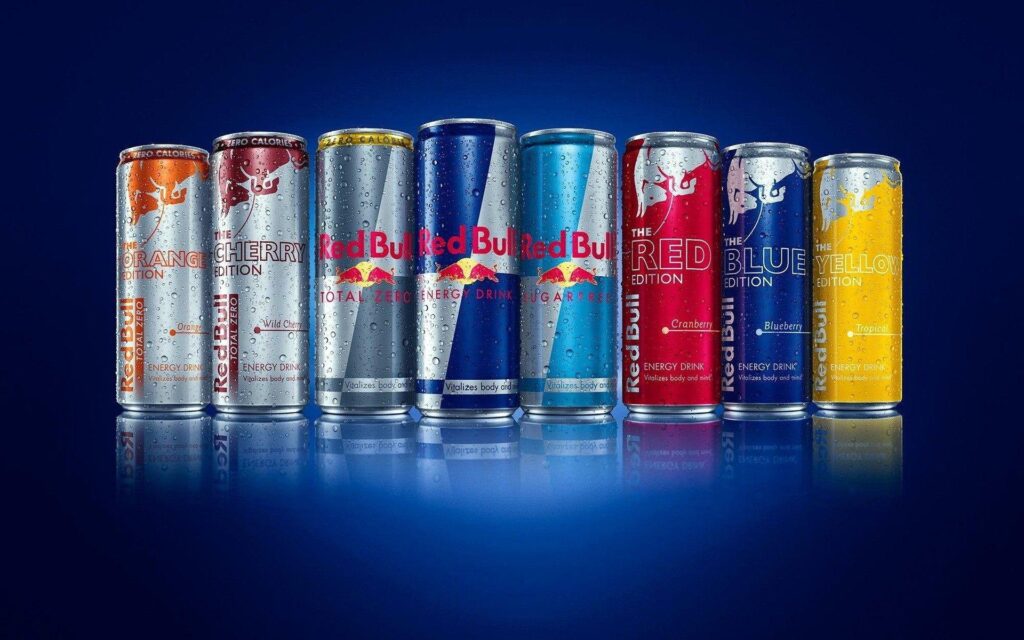
What’s in a can of Red Bull that gives you wings? Let’s break down the key ingredients that power this popular energy drink and how they affect your body.
1. Caffeine: The Primary Energy Driver
Red Bull contains 80mg of caffeine per can. This key ingredient boosts alertness, reduces fatigue, and increases dopamine levels in the brain.
Caffeine is the main reason people feel more awake and focused after drinking Red Bull.
2. Sugar: Quick Energy Source
Each can of Red Bull packs 27g of sugar. This provides a rapid energy boost as blood glucose levels rise.
However, this quick spike can lead to energy crashes later, affecting the length of the drink’s effects.
3. B-Vitamins: Essential for Energy Metabolism
Red Bull includes B vitamins like B3, B5, B6, and B12. These vitamins are crucial in converting food into energy and supporting proper nervous system function.
While they don’t provide energy directly, they help your body use energy more efficiently.
4. Taurine: An Amino Acid with Potential Benefits
Red Bull contains 1000mg of taurine per can. Some studies suggest taurine may improve athletic performance and reduce muscle damage.
However, the exact role of taurine in energy drinks is still being researched.
Duration of Red Bull’s Energizing Effects
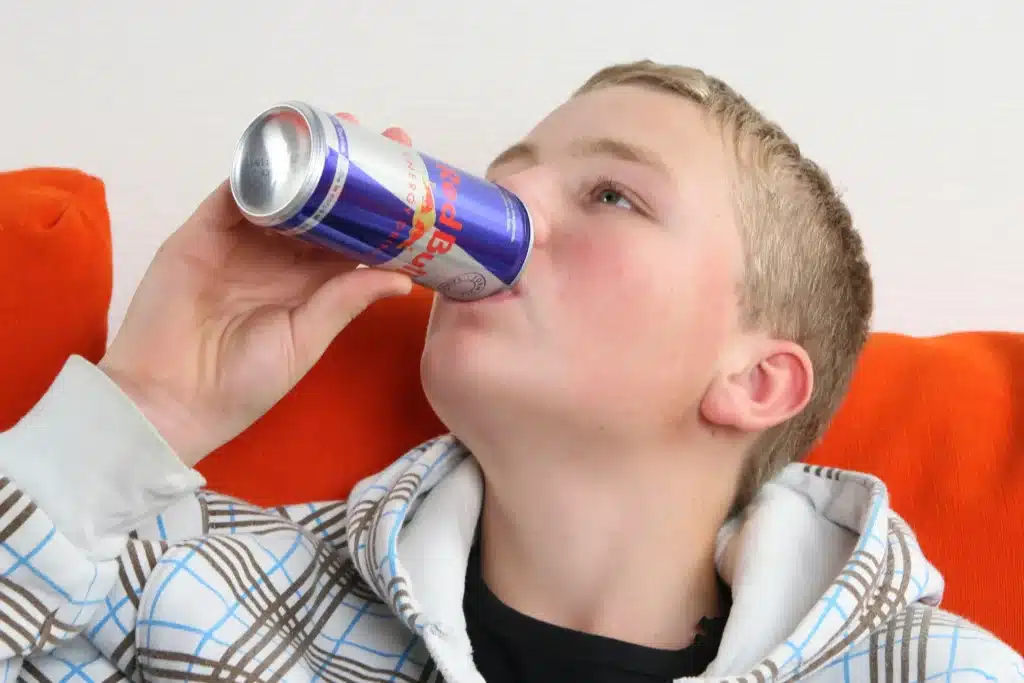
How long does a Red Bull last? While everyone’s experience may differ, there’s a general timeline for Red Bull’s effects. Let’s examine the typical duration of its energy boost.
Average Duration: 1-4 Hours
When you drink Red Bull, you might wonder: How long does it last? The answer isn’t the same for everyone, but there’s a general timeline you can expect.
The energy-boosting effects of Red Bull typically start to kick in within 15-45 minutes after you drink it. This is when you’ll begin to feel more alert and focused.
Most people experience peak energy levels around 30-60 minutes after finishing their Red Bull. This is when you’ll likely feel the full impact of the drink’s energizing ingredients.
The total duration of Red Bull’s effects can vary widely, but most people experience a duration of 1 to 4 hours.
This range depends on several personal factors, which we’ll explore in more detail in the next section.
Factors Affecting the Duration
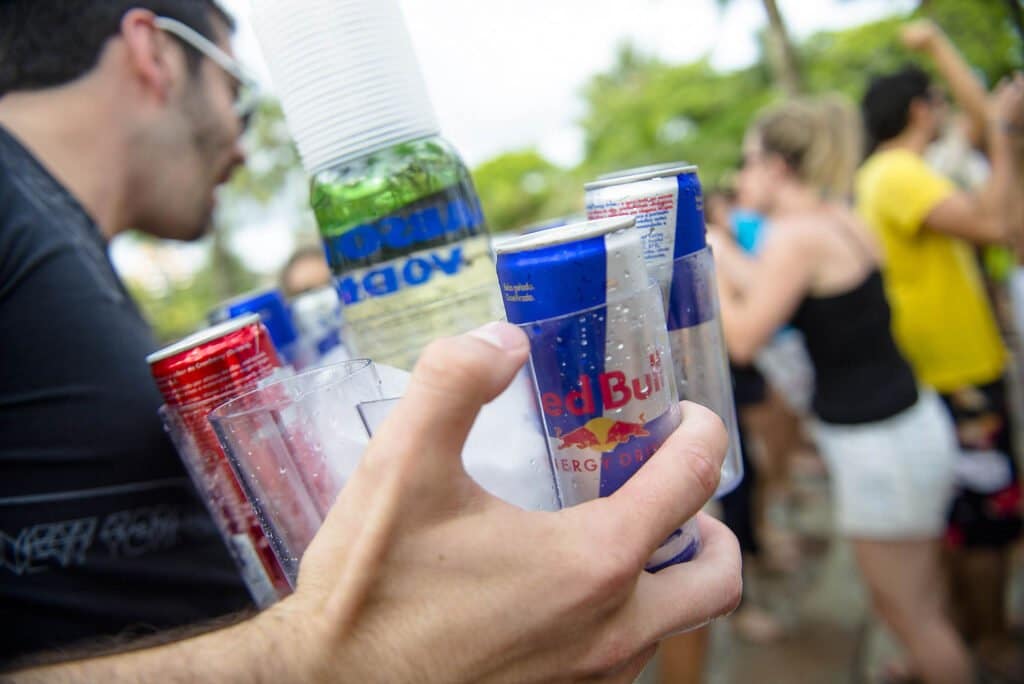
Have you ever wondered why Red Bull’s effects last longer for some people than others? Let’s explore the key factors influencing how long a Red Bull lasts in your system.
1. Metabolism
Your body’s metabolism greatly affects how quickly you process Red Bull’s ingredients. If you have a faster metabolism, you might find that the energizing effects don’t last as long. Your body burns through the caffeine and sugar more quickly.
2. Caffeine Tolerance
If you regularly drink coffee or consume energy drinks, you may have built up a caffeine tolerance.
This means you might not feel the effects of Red Bull as strongly or for as long as someone who rarely consumes caffeine.
3. Body Weight
Your weight can also affect how long Red Bull’s energy boost lasts. Generally, people with lower body weight may feel the effects longer.
This is because there’s less body mass for the caffeine and other ingredients to distribute through.
Understanding these factors can help you better predict how long a Red Bull will last.
External Factors

How long does a Red Bull last? While individual factors play a role, external circumstances can also impact the drink’s effects. Let’s look at key external factors influencing your Red Bull experience.
1. Consuming on an Empty Stomach
Drinking Red Bull when you haven’t eaten can speed up how quickly your body absorbs its ingredients.
This might make you feel the energy boost faster, but it can also increase your risk of side effects like jitters or an upset stomach.
2. Alcohol Consumption
Some people mix Red Bull with alcohol, but this can be risky. The energy drink might mask alcohol’s effects, leading you to drink more than you realize.
This combination can also put extra stress on your heart and liver.
3. Sleep Deprivation
While using Red Bull to power through when you’re tired is tempting, it’s not a substitute for sleep.
Relying on energy drinks when you’re sleep-deprived can disrupt your natural sleep patterns even further, potentially leading to a cycle of poor sleep and increased reliance on caffeine.
Understanding these external factors can help you make smarter choices about when and how to consume Red Bull for the best and safest results.
Potential Health Risks of Frequent Consumption
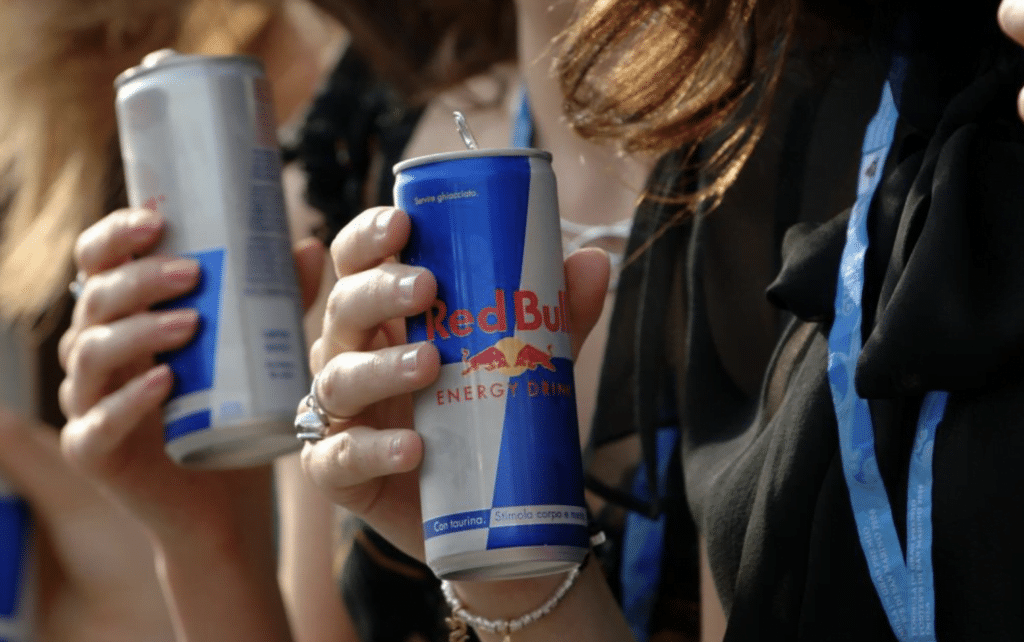
While many people enjoy Red Bull for its energy-boosting effects, it’s important to be aware of the potential risks associated with frequent consumption.
Understanding these risks can help you decide how often to drink Red Bull.
Caffeine Overdose
Consuming too much caffeine can lead to unpleasant symptoms like restlessness, a racing heartbeat, and trouble sleeping. In severe cases, it may even cause seizures.
Increased Sugar Intake
The high sugar content in Red Bull can contribute to health issues like obesity, type 2 diabetes, and heart disease if consumed excessively over time.
Dehydration and Electrolyte Imbalance
Red Bull’s caffeine content can increase urine production, potentially leading to dehydration. This can cause muscle cramps, tiredness, and difficulty thinking clearly.
Sleep Disruption
Regularly drinking Red Bull, especially later in the day, can interfere with your sleep patterns. This may lead to mood swings, memory problems, and a weakened immune system over time.
Addiction and Dependence
Some people may develop a cycle of energy highs and lows from frequent Red Bull consumption. This can lead to withdrawal symptoms like headaches when trying to cut back.
Interaction with Medications
Red Bull might interact with certain medications, including some antidepressants and antibiotics. It’s always best to check with your doctor about potential interactions.
Remember, moderation is key in energy drinks like Red Bull.
Final Words
The question “How long does a Red Bull last?” has no one-size-fits-all answer. Its effects typically peak within an hour and can last 1-4 hours, but this varies based on factors like metabolism, caffeine tolerance, and body weight.
External circumstances, such as drinking on an empty stomach or mixing with alcohol, can also impact its duration and safety.
While Red Bull can provide a quick energy boost, it’s crucial to be mindful of potential health risks associated with frequent consumption.
Instead of relying on energy drinks, consider healthier alternatives to maintain energy levels, such as getting adequate sleep, staying hydrated, and eating a balanced diet.
If you choose to drink Red Bull, do so in moderation and be aware of how your body responds so you can make informed decisions about your consumption.
Frequently Asked Questions
1. How long do the effects of Red Bull last?
The effects of Red Bull typically last 1-4 hours, varying by individual. Factors like metabolism, caffeine tolerance, and body weight influence duration.
Most people experience peak energy levels 30-60 minutes after consumption, with effects gradually tapering off. Regular consumers may feel shorter-lasting impacts due to increased tolerance.
2. What is the duration of action of Red Bull?
Red Bull’s duration of action generally spans 1-4 hours. The energy boost usually kicks in within 15-45 minutes, peaks around 30-60 minutes post-consumption, and then slowly declines.
However, this timeline can vary based on personal factors like metabolism rate, caffeine sensitivity, and overall health condition.
3. What external factors affect Red Bull?
External factors affecting Red Bull include consuming it on an empty stomach, which can speed up absorption but increase side effects.
Mixing with alcohol can mask alcohol’s effects, potentially leading to overconsumption. Sleep deprivation can alter Red Bull’s effectiveness, as it’s not a substitute for proper rest.
4. How long does it take for the effects of Red Bull to go away?
Red Bull’s effects typically fade within 1-4 hours after consumption. However, caffeine, its primary stimulant, has a half-life of about 5 hours in healthy adults.
This means caffeine can take up to 10 hours to eliminate caffeine from your system, though noticeable effects subside earlier.

